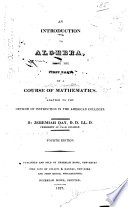 | Jeremiah Day - Algebra - 1827 - 352 pages
...quantities are proportional. If the two products are not equal, the quantities are not proportional. ^A 378. In mathematical investigations, when the relations...will not destroy the proportion. Thus, if a : b'. '.c : d, the order of these four quantities may be varied, in any way which will leave ad=bc. Hence,... | |
 | Silas Totten - Algebra - 1836 - 332 pages
...fractions being equal, and the denominators the same, the numerators must also be equal ; and hence, the product of the means equal to the product of the extremes. (66.) The property of geometrical proportions which has just been proved, is the fundamental principle... | |
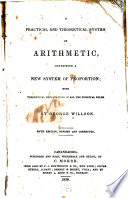 | George Willson - Arithmetic - 1838 - 194 pages
...is there between the product of the means, and the product of the extremes of a proportion ? Why is the product of the means equal to the product of the extremes ? ' What rule is founded on this equality ? Explain the common method of stating in the Single Rule... | |
 | Jeremiah Day - Algebra - 1841 - 354 pages
...given, they are frequently stated in the form of a proportion. But it is commonly necessary that ihis first proportion should pass through a number of transformations...products, will not destroy the proportion. Thus, if a : b : : c : d, the order of these four quantities may be varied, in any way which will leave ad=bc. Hence,... | |
 | James Bates Thomson - Algebra - 1844 - 272 pages
...proportional. 343. It is evident that the terms of a proportion may undergo any change which will not destroy the equality of the ratios ; or which will leave the...of the means equal to the product of the extremes. These changes are numerous, but they may be reduced to a few general principles. CASE I. Changes in... | |
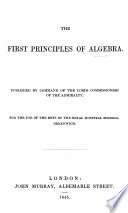 | Admiralty - 1845 - 152 pages
...equation, Divide by 13 .-. ж=12 61. An equation may be formed from 4 proportional quantities, by making the product of the means equal to the product of the extremes. Let the proportional quantities be x, y, a, b ; or x : y : : a : b. Vy-J (Art. 15.) .-. bx=ay. (Art.... | |
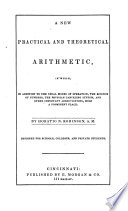 | Horatio Nelson Robinson - Arithmetic - 1845 - 310 pages
...is there between the product of the means, and the product of the extremes of a proportion ? Why is the product of the means equal to the product of the extremes ? What rule is founded on this equality ? Explain the common method of stating in the Single Rule of... | |
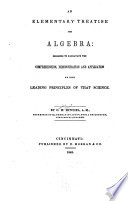 | Ormsby MacKnight Mitchel - Algebra - 1845 - 308 pages
...:: D : C; B : D : : A : C, &c. &c. From each of which we may readily derive the equation AD= CB, or the product of the means equal to the product of the extremes. Many other properties might be presented, but we limit ourselves to this short discussion, and proceed... | |
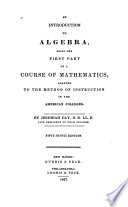 | Jeremiah Day - Algebra - 1847 - 358 pages
...quantities are proportional. We have only to multiply the means together, and also the extremes. If the products are equal, the quantities are proportional....products, will not destroy the proportion. Thus, if a : b : : c : d, the order of these four quantities may be varied, in any way which will leave ad=bc. Hence,... | |
 | James Bates Thomson - Algebra - 1847 - 266 pages
...is evident that the terms of a proportion may undergo any change which will not destroy the equn ity of the ratios ; or which will leave the product of the means equal to the product of the extremes. These changes are numerous, but they may be reduced to a few general principles. CASE I. Changes in... | |
| |